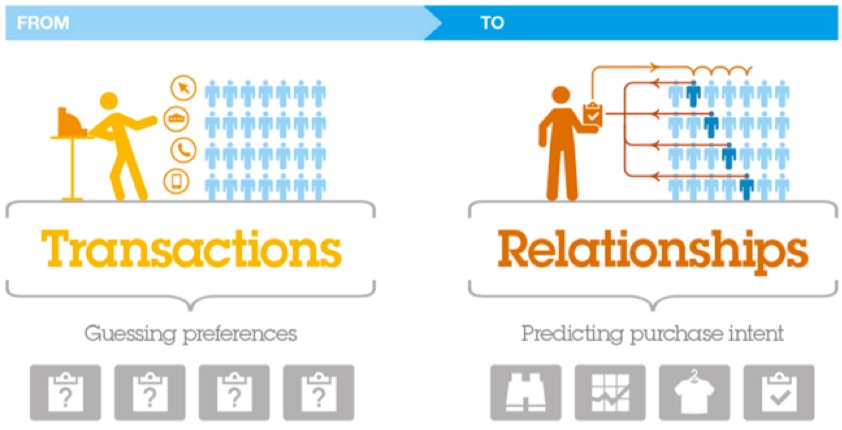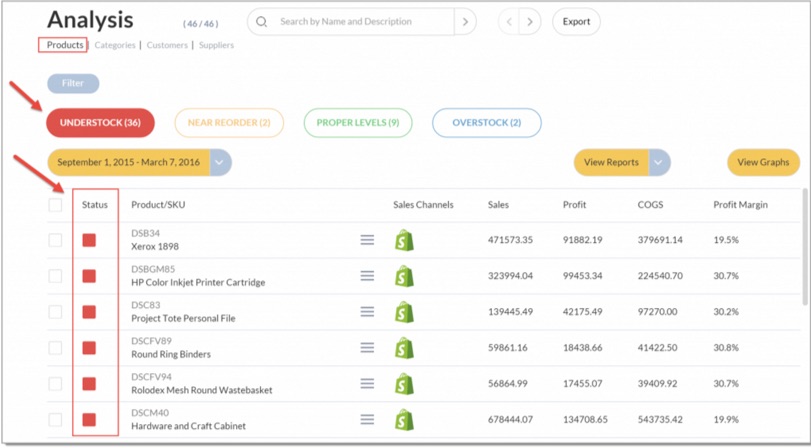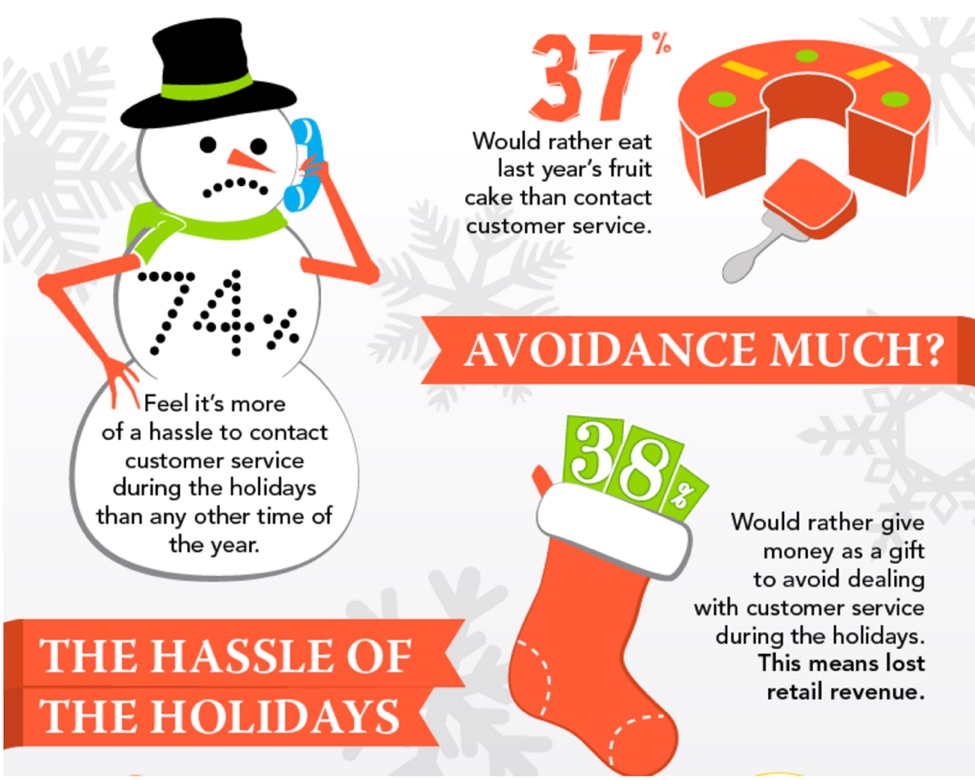The gift of analytics.
Ramp up for the holidays by focusing on customer analytics. With the help of data, your team can target buyers, plan seasonal promotions, and manage your inventory levels.
Research shows that “49% of companies who champion the use of customer analytics are likely to have profit well above their competitors.” It’s one of the best ways to differentiate your business in the market.
“Customer analytics enables organizations and enterprises to make data-driven business decisions for direct marketing, site selection, and customer relationship management. The result is a 360-degree view of customers,” says Molly Galetto, vice president of marketing communications at NGDATA.
This holiday season aim to study your data. Let’s explore how you can earn more sales.
Take an Omnichannel Approach
Holiday shoppers will discover your products from various channels, including mobile, email, and offline activities. Prepare to serve their needs no matter how they find you.
PricewaterhouseCoopers announced that two-thirds of shoppers can be considered omnichannel consumers. These people research products and make purchases using a combination of technology, online platforms, and physical stores.
For instance, shoppers may see your product via a Twitter ad, and then conduct brand research on their tablets. And finally purchase your product from their desktop computers using an email promo code.
Buxton reports that “the average consumer doesn’t think about the complexity of merging offline and online retailing. They simply know that they are purchasing a product from your brand and expect their experience to be the same no matter what channel they use.”
Work with your team to develop a seamless experience across channels. Customers shouldn’t feel confined to work with one or the other.
Observe consumer habits to determine how your audience interacts on each channel. This will help your team predict purchasing intent. Then, aim to build interconnected relationships, not one-off transactions.

Ditch the mindset that your brand’s online shop competes with in-store sales. Concentrate on integration for a better shopping experience.
“As shoppers are becoming more channel-agnostic, and more omnichannel in their customer journey, the retailers that are breaking through and meeting their demands are realizing the greatest returns this holiday shopping season. It’s no longer about brick and mortar vs. e-commerce,” writes Stuart Lazarus, former vice president of sales at Signal.
Give holiday shoppers a choice. Let them decide the best channel for their purchasing needs.
Focus on Specific Shopping Days
All shopping days aren’t created equal. Consumer purchasing habits change based on various factors, like the industry, product price, and the end user.
This season, stay away from mindlessly following your competitors—as they may lead you in the wrong direction. Plus, what works for their consumers isn’t always the best for your buyers.
Use historical data to learn your sales peaks and valleys during the holiday season. Which days and times experienced an influx in sales?
Then, focus your sales and marketing efforts on these specific days to gain consumer attention. Your brand may want to host promotional giveaways or offer a discount. And the time-constraint will urge shoppers to act now or risk missing out on the promotion.

RetailNext predicts that Black Friday will lose its title as the most popular shopping day this holiday season. The excitement of early bird sales is transforming into shopper’s fatigue. Therefore, brands are shifting to a long-term strategy.
“With this in mind, retailers are now transitioning the traditional holiday shopping process into a month-long ordeal. Furthermore, retailers are noting the need for convenience and offering more omnichannel services to consumers,” says Genevieve Scarano, staff writer and assistant editor at Sourcing Journal.
During the holidays, make increasing customer value a priority. Persuade shoppers to learn more about your brand’s mission and values. You want shoppers to stick around after the holiday rush.
Manage Your Inventory
During this time of year, it’s important that your team monitor inventory. Bad inventory management leads to delayed order fulfillment, which extends your cash flow cycle.
In 2015, out-of-stocks accounted for $634.1 billion in lost retail sales. When your brand fails to deliver, customers get frustrated and seek out your competitors’ products.
Overstocking isn’t ideal either. You don’t want a surplus of products taking up shelf space. Excess inventory costs money and negatively affects your bottom line.
“Missing out on sales because of stockouts is a scary thing – but this doesn’t mean that you should overstock. Remember, keeping stock in your warehouse carries a cost of its own, both in terms of the cost of additional warehousing space, and the amount of capital that gets tied up in the inventory,” says Ruoshan Tao, an inbound marketer at TradeGecko.
Strive to create an optimal system that works for your business. Setting par levels is one technique that speeds up future decision-making.
Casandra Campbell, a content creator at Shopify, offers some sound advice:
“Make inventory management easier by setting ‘par levels’ for each of your products. Par levels are the minimum amount of product that must be on hand at all times. When your inventory stock dips below the predetermined levels, you know it’s time to order more.”
If you haven’t already, invest in an inventory management dashboard. Then, you can be automatically notified when certain products fall below your par levels.
Here’s an example showing a filtered list of all the understocked products. It’s a simple process— even for your newest team members.

Forecast demand to make products readily available to customers and to reduce your costs.
Upgrading Customer Service
The holidays are hectic. Shoppers juggle everything from buying gifts to preparing holiday feasts. So, be mindful of your customer service efforts.
Studies reveal that some customers would rather avoid shopping altogether in order to skip the hassle of poor service. A lack of quality service wastes the buyers’ time and causes them to stress more.
A stressed consumer will just abandon his shopping cart. And this equates to less revenue for your brand.

Moreover, NewVoice reveals that 42% of consumers switch brands because they are put off by rude or unhelpful staff. This issue can easily be resolved by training your staff to show empathy to customers.
To upgrade your customer service, perform a quality control check of customer phone calls and emails. How do your employees respond to customer complaints? Or any of the customer’s questions left unanswered?
This qualitative data will offer insight on how to improve your service. The results may involve hosting a formal training for all staff members or coaching specific individuals.
Use the gathered data to learn the problems plaguing your customers. Identifying issues early helps your team solve the problems sooner, rather than later.
“For this holiday season and beyond, it’s crucial to empower customer service with the analytics capabilities needed to pinpoint and truly understand customer issues in order to deliver a seamless customer experience and ultimately ensure brand loyalty,” says Ken Bisconti, vice president of IBM Customer Analytics.
Experiment with different customer service methods. Make your shoppers’ lives easier.
‘Tis the Season for Analytics
Don’t neglect your use of data this holiday season. It’s an opportunity to connect with more shoppers and drive your revenue upward.
Prepare to sell consumers through multiple channels. Focus on specific shopping days to maximize your promotions. And continue to upgrade your customer service to relieve buyers from the stress of shopping.
Pay attention to your customer analytics. Happy holidays!
About the Author: Shayla Price lives at the intersection of digital marketing, technology and social responsibility. Connect with her on Twitter @shaylaprice.
from The Kissmetrics Marketing Blog https://blog.kissmetrics.com/keep-analytics-at-the-forefront/
No comments:
Post a Comment